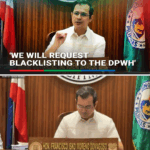“Isko: Discaya-Linked Firms Among 100 Flood-Control Contractors Who Haven’t Paid Taxes in Manila”
Introduction
On September 4, 2025, Manila Mayor Francisco “Isko” Moreno announced that from a pool of 315 contractors engaged in flood-control projects across the city, around ₱255 million in contractor taxes remains unpaid. Among the firms delinquent in settling their obligations are several linked to the influential Discaya family, a high-profile developer group whose companies have drawn scrutiny over alleged irregularities in government contracts. This situation highlights ongoing concerns around accountability, proper permitting, and governance in flood-control initiatives in Manila.
Scope of Delinquency
Mayor Moreno revealed that of the 315 contractors currently working on flood-control projects, only nine have paid—amounting to ₱8 million—leaving a substantial ₱255 million still owed to the city.
The city government has issued Statements of Account (SOAs) alerting contractors of their outstanding liabilities. Intriguingly, Mayor Moreno noted that some companies did not even accept the notices—a gesture interpreted as willful defiance. “I wish them good luck… they were given due process yet they still didn’t answer,” he remarked.
The Discaya Connection
Among the delinquent firms are several companies with ties to the Discaya family. These include Saint Timothy Construction Corporation, explicitly mentioned by Mayor Moreno during the press briefing. He confirmed that Discaya-linked firms are among those who have not complied with their tax obligations.
The Discaya portfolio is extensive; as documented, Sarah Discaya and her husband, Curlee Discaya, control multiple construction firms—including Alpha and Omega, St. Gerrard, St. Timothy, Elite General Contractor, among others—many of which have been awarded flood-control contracts.
Manila’s Diplomatic—and Legal—Approach
Mayor Moreno emphasized the city’s preference for a diplomatic approach, stating: “As much as possible, we are being diplomatic with them… but if they do not respond, we have no recourse but to file charges… and act on the basis of evidence.”
Contracts will be blacklisted if delinquent firms fail to settle. The city plans to coordinate with both the City Engineering Office and the Office of the Building Official, and will also urge the Department of Public Works and Highways (DPWH) to issue their own blacklisting. This means uncooperative companies may be barred from securing permits or entering new projects.
Broader Context: Flood-Control Controversy
This tax issue is only one facet of a larger scandal affecting Manila and other parts of the Philippines. Ongoing investigations expose alleged ghost projects, substandard constructions, and potential monopolization of flood-control contracts by a select circle of powerful firms.
In fact, in 2025, the Office of the Ombudsman established a special two-page directive to investigate irregularities in flood-control contracts, ordering a 13-member panel to gather evidence and pursue criminal and administrative action.
Public Response & Escalation
The situation has evolved beyond press releases. On September 4, protesters—composed of flood-affected residents and environmental advocates—staged a demonstration at the Discaya-linked St. Gerrard Construction offices in Pasig. They hurled mud and spray-painted tags like “magnanakaw” (“thieves”), “corrupt”, and “ikulong” (“lock them up”). Mayor Vico Sotto of Pasig and Malacañang urged calm, discouraging acts of violence.
Summary & Implications
Aspect
Details
Number of contractors
315 flood-control contractors in Manila
Settlements so far
Only 9 companies paid (~₱8 million)
Outstanding liability
~₱255 million
Discaya-linked firms
Among delinquent; includes Saint Timothy Construction
City response
Issuing SOAs, planning charges, impending blacklisting
Contextual concerns
Part of broader flood-control project irregularities
Public unrest
Protests at Discaya-linked offices; public frustration growing
Final Thoughts
Mayor Isko Moreno’s announcement on September 4, 2025, underscores both the logistical and political challenges in managing flood-control projects in Manila. The fact that nearly ₱255 million in contractor taxes remain unpaid—with firms dodging notices—speaks to entrenched compliance issues and perhaps deeper systemic dysfunction.
The involvement of high-profile firms like those connected to the Discaya family adds further complexity. Their prominence in the industry—and presence in local and national flashpoints over wealth, infrastructure failures, and political ties—places them at the heart of both formal investigations and public outrage.
As Manila pursues diplomatic clarity and legal accountability—threatening blacklisting and formally preparing filings—citizens and government alike are watching closely. This incident isn’t just about unpaid taxes; it symbolizes the broader demand for integrity, transparency, and genuine public service in Philippine governance.
News
Mayor Isko uncovers ₱255M unpaid taxes; Discaya-linked firms, 300 contractors face blacklisting, legal battles, and corruption scandal.
Isko Moreno Flags Discaya Firms, 100 Other Contractors for ₱255 Million in Unpaid Taxes Manila Confronts Massive Tax Delinquency Amid…
Ang Malalim na Kuwento ng Pagdating ng Baby Brother Kasabay ng Pagpanaw ni Mama
Ang Malalim na Kuwento ng Pagdating ng Baby Brother Kasabay ng Pagpanaw ni Mama Panimula Isang gabi na puno ng…
OMG! Ryzza Mae Dizon Biktima ng Karumal‑dumal na Krimen, May Bagong Detalyeng Nagpalala sa Lahat
OMG! Ryzza Mae Dizon biktima ng karumal-dumal na krimen, may bagong detalyeng nagpalala sa lahat Isang nakakagimbal na balita ang…
Cristine Reyes’ secret romance revealed! Ara Mina breaks silence, drops surprising truths about her sister’s mysterious new boyfriend.
Ara Mina Breaks Silence on Cristine Reyes’ New Romance: “As Long As She’s Happy, We’re Okay” The entertainment world thrives…
Korina Sanchez drops cryptic “receipts” remark—netizens ask: Was it a subtle swipe at Mayor Vico Sotto’s explosive claims?
Did Korina Sanchez Take a Swipe at Vico Sotto? The Story Behind the Brewing Media-Politics Clash When veteran broadcast journalist…
🔥 Ashtine Olviga and Andres Muhlach spark rumors—love, trust, and secrets revealed before their big-screen debut! 👀✨
Ashtine Olviga and Andres Muhlach: A Partnership Built on Trust, Friendship, and Motivation In Philippine showbiz, partnerships often come and…
End of content
No more pages to load











